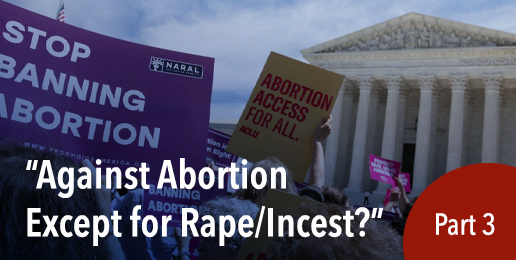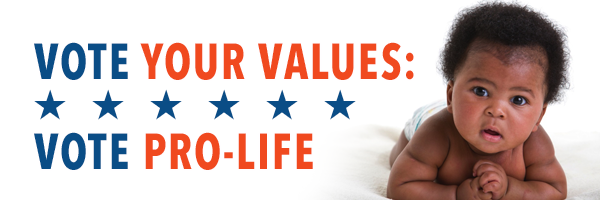
Last time, we explored a simple way to show someone that “pro-life except for rape and incest” is not really pro-life.
Just ask him if the same circumstance that he thinks justifies abortion would also justify the killing of a two-year-old.
To be sure, rape is horrible and deserves the judgment of God, but since we don’t allow the killing of two-year-olds conceived in rape, neither should we allow the abortion of first-trimester babies conceived that way.
The solution to violence is not more violence.
The only way that I can see someone even trying to come back from this refutation is to argue that there’s some fundamental difference between two-year-olds and first-trimester babies, one which explains why he would treat one with respect and the other with disregard.
And yet, despite the many obvious differences between the two stages of life, I do not believe it is possible to identify a single difference that actually affects the worth of human life at that stage.
Pro-life apologists often use the acronym “SLED” to explain this point—this acronym was developed by pro-life thinker Stephen Schwarz in his book Moral Question of Abortion.
The SLED acronym lists the four main differences between a toddler and a preborn baby: size, level of development, environment, and dependency on others.
However, none of these make a person any more valuable than another.
- Size — A toddler is certainly larger than a first-trimester baby. But a large person is not inherently more valuable than a small person. I happen to be 6′ 5″, but I do not consider myself therefore any more valuable than my friend who is 5′ 3″. Neither do I consider myself to have gotten more valuable during my teenage years when I was rapidly growing.
- Level of Development — A toddler is much more developed than a first-trimester baby (organ systems, physical ability, mental capacity, etc.). But someone who’s more developed is not inherently more valuable than someone who’s less developed. Are kids with learning disabilities less valuable than those with more developed minds? Are kids post-puberty more valuable than kids pre-puberty?
- Environment — A toddler obviously lives in a different location than a first-trimester baby. But a person outside of the womb is not inherently more valuable than someone inside the womb. Your location has absolutely nothing to do with your value; and there’s nothing special about the birth canal or the C-section procedure that magically makes you human once you’re outside the womb.
- Dependency — A toddler is not as extremely dependent on his mother for survival than a first-trimester baby. But someone who’s dependent on someone or something else for survival is not inherently less valuable than someone who can live independently. After all, newborns are also completely dependent on their parents for survival, but no one would think of killing them for that reason. Neither is this true of adults—you don’t lose value when you get connected to a respirator or IV line, even though you can no longer sustain life on your own. And as Francis Beckwith, author of Defending Life, points out: we’re all ultimately dependent on the earth’s ecosystem in order to live. Put any one of us naked on the moon, and we instantly become—to use an abortion-debate buzz word—”non-viable.” Your dependency on someone or something else thus has nothing to do with your value as a human.
(Now, I could add one other obvious difference between a toddler and a first-trimester baby: age. Yet, if someone thought that age affected one’s value, wouldn’t we call that “ageism?” I even know of a particular pro-life group, Created Equal, whose shirts say “End Ageism, End Abortion.”)
All in all, none of these four major differences have any effect on someone’s innate value.
Either the defender of abortion must come up with a fifth difference that actually does affect someone’s innate value, or he must agree that we must treat the unborn the same as we’d treat two-year-olds.
The dismissive “that’s different” response just doesn’t cut it.
Let’s wrap this all up now. Because there’s no substantial difference between a human life 10 weeks after conception and a human life 2 years and 10 weeks after conception, we cannot approve of abortion for a particular reason and simultaneously oppose the killing of a toddler for that same reason.
The same human value rests in all human life, regardless of size, development, location, or dependency on others. Therefore, the “Trotting out the Toddler” is a very important question to ask. It makes things a whole lot simpler and straightforward when defending the unborn in a discussion.
Ultimately, this whole discussion shows that you cannot be “pro-life” and still support abortion in the case of rape or incest. As tragic as these circumstances are, you know you wouldn’t kill a toddler for the same reasons.
To be consistent, you’d have to say that the value of life fluctuates with external factors, which is directly contradictory to its true nature as a gift from God. That’s not “pro-life,” that’s “devaluation of life.” Just as you can’t be “pro-marriage” if you “mostly” oppose adultery, you can’t be pro-life if you “mostly” oppose abortion.






















